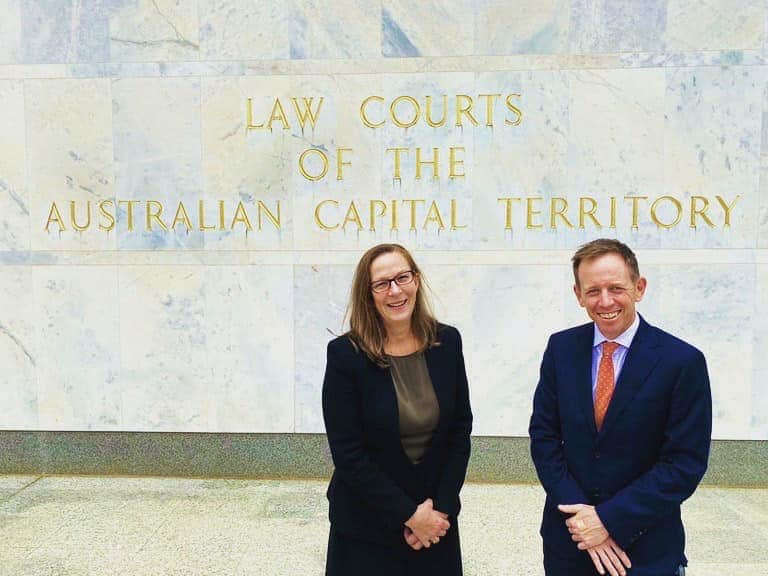Lucy McCallum was sworn in as the ACT’s new and second woman Chief Justice on International Women’s Day today, taking over the reins of the Supreme Court from Helen Murrell, the ACT’s first woman Chief Justice.
“I’m very excited,” Ms McCallum said. “This is about the best job I could possibly have at the moment. It suits the skill set that I’ve developed, and I’m really excited about leading a small court.”
Ms McCallum worked as a public prosecutor in Canberra in the 1980s. She was appointed Justice in the Common Law Division of the NSW Supreme Court in 2008, and elevated to the NSW Court of Appeal in January 2019.
Ms McCallum believes the law should serve the underprivileged. As Chief Justice, reducing the over-representation of Aboriginal and Torres Strait Islander people in the justice system would be “front and centre of [her] leadership”, she said.
The ACT has the lowest adult imprisonment rate in Australia (seven per cent decrease from 2018), Canberra Daily reported last year – but Indigenous people are 16 times more likely to be incarcerated. (Even then, this is still the second lowest rate in Australia.) Half of the women and a quarter of the men in the Alexander Maconochie Centre are Aboriginal or Torres Strait Islanders, while 30 per cent of the children in out-of-home care are from Indigenous communities.
A lot of the legal profession, important institutions, and Attorney-General Shane Rattenbury are “all very much on board with the need to address that national tragedy,” Ms McCallum said.
First Nations communities face endemic problems such as poor education, or children introduced to drugs and alcohol.
“It sounds trite and a bit twee to say society should bear responsibility for that,” Ms McCallum said.
But she wants a conversation around that moral culpability, and how to prevent endemic problems, rather than simply coming in as a ‘repairer’.
“I heard on the news that in response to the floods, apparently they spend something like 97 per cent mopping up after floods, and three percent of our budget preparing for them. It’s the same idea. We need to spend more money investing in preventing crime and dysfunctional family circumstances, so that we spend less money [on incarcerations].”
Ms McCallum has said she will focus on cementing the ACT’s reputation as a place of excellent jurisdiction. The court will use social media more; she envisages a one-way Facebook page where researchers can prepare case summaries that the public can easily comprehend.
She believes courts should accept that jurors will read about cases before trials.
“They’re not idiots. … They’re going to come to court with a preconceived view. We need to embrace the idea that jurors, like judges, are capable, if they’re given the right direction, of putting what they’ve read out of their mind, and focusing on the task they are directed to perform.”
Mr Rattenbury said he was “delighted with the calibre of judicial excellence that Chief Justice McCallum brings with her”. He believes her passion for reducing Indigenous overrepresentation would greatly assist in improving justice in the ACT.
Ms McCallum succeeds Chief Justice Helen Murrell, the ACT’s first woman Chief Justice, appointed in 2013.
Under Ms Murrell’s leadership of the ACT Supreme Court, Mr Rattenbury said, the Drug and Alcohol Sentencing List was established; new case management and listing practices saw a significant reduction in hearing delays; and the challenges of the COVID-19 pandemic for the court were successfully navigated.
“These adaptations in procedure have amounted to very real improvements in the lives of people coming before the Court, and they provide a fantastic basis to continue this legacy.”



